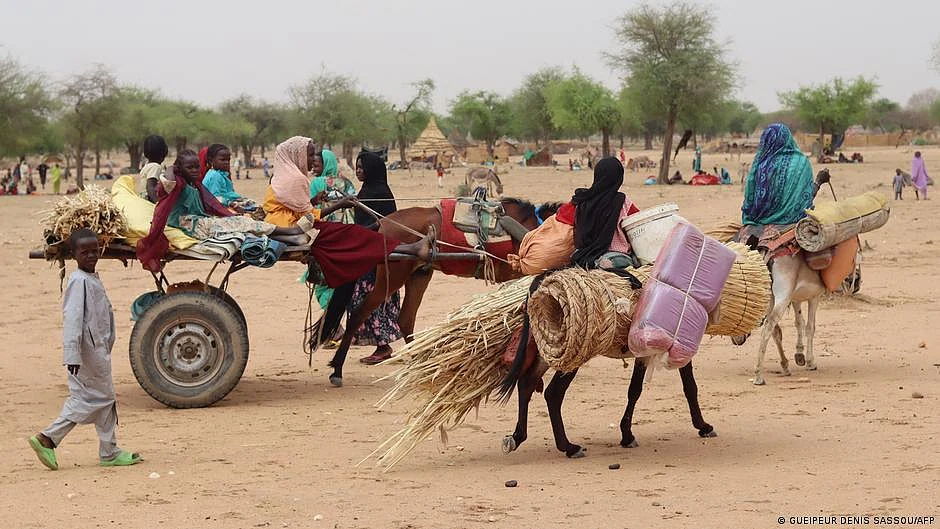How the Sudan crisis threatens the entire Sahel
UN Special Representative Volker Perthes believes that the fighting in Sudan attracts "opportunists and mercenaries," who seek to enrich themselves

Despite talks between warring parties, which met in Jeddah, Saudi Arabia over the weekend, air strikes were reported in Khartoum amid ongoing fighting.
Tens of thousands of civilians have fled, and the United Nations has warned of a catastrophic humanitarian crisis, which could spill over into neighboring countries.
More weapons in circulation
"There is currently no regional consensus on how to stop the violence — making matters more difficult," explained Henrik Maihack of the Friedrich Ebert Institute (FES).
"In the Horn of Africa region, there is no functioning collective security system among neighboring countries. Security is often organized against each other," Maihack told DW.
UN Special Representative Volker Perthes also recently told DW that the fighting in Sudan attracts "opportunists and mercenaries," who seek to enrich themselves.
Another danger is proliferation of small arms, which cross Sudan's over porous borders and may even reach as far afield as Mali and Burkina Faso, Maihack fears.
Armed groups already operate in those countries, and new weapons would lead to worse security situation in the Sahel, according to Maihack. He warns the Sudan crisis could fuel "two crisis regions:" in the Horn of Africa and the Sahel.
Humanitarian crises worsening across the region
Maihack said there were humanitarian emergencies in Somalia, Sudan and South Sudan even before fighting broke out, and that relief efforts were underfunded.
Since April 15, Sudanese Armed Forces units loyal to Abdel-Fattah Burhan, have been fighting rival Mohamed Hamdan Dagalo's Rapid Support Forces (RSF).
Their fight for supremacy has put neighboring nations under pressure. Some of these states are under military rule, an unstable security situation and economic trouble — or a combination thereof. Now, thousands of refugees from Sudan are streaming across the border to South Sudan, Chad, or the Central African Republic (CAR). Those that can go further afield.
More support needed for the region's countries
The UN High Commission for Refugees (UNHCR) is bracing itself to support around 800,000 refugees in the region if the fighting does not end soon. But for many countries, there are severe challenges to hosting the incoming refugees. Local governments cannot support them financially, said UNHCR spokesperson Eujin Byun.
Ethiopia, South Sudan, Chad and Egypt have already taken in many Sudanese, she added.
"More than 70% of the refugees that are crossing the border are women and children," Byun told DW.
"They're walking for 24 hours with barely anything and arriving at the border area with barely anything: without shelter, no water, food or clothing."
Chad has accepted 600,000 refugees — including 400,000 Sudanese from this crisis.
"We already have a system on the ground, but was already overstretched," said Byun, calling on the international community for more assistance.
Byun suggested that more engagement is also needed from the affected countries, which in turn have asked for international support.
The Central African Republic, for instance, is one of those: thousands of people have so far crossed from Sudan to CAR.
Their presence is forcing the government to work with aid organizations to arrange better assistance, said Herve Ndoba, the CAR's finance minister.
"We have just received approval for the program with the International Monetary Fund," Ndoba said, adding that the International Monetary Fund granted the country an option for further loans at the end of April.
The CAR government now wants to examine how much money can be taken from the state budget for aid measures, he said.
Sudan's leadership battle concerns neighbors
Sudan has seven land borders. Ahmed Soliman of the London-based think-tank Chatham House believes this fact alone could cause the Sudan crisis to spill over into a greater regional conflict.
"All those neighboring countries will be looking to influence outcomes and have interest in who will be leading Sudan," he told DW.
Sudan is also on the crossroads of different regions: North Africa, the Sahel, East Africa, the Horn of Africa and the Arabian Gulf.
"It's a very complicated picture of regional influence and interests, which we are now seeing during the negotiations to end the hostilities," Soliman said.
Deep ties with Chad
Sudan's western neighbor, Chad, is politically unstable, having gone through its own civil wars and uprisings.
The exodus from the West Darfur region has followed a pattern of cyclical displacement over the 20 years since the Darfur conflict began.
Darfur is not only the destination for international forces in Sudan.
RSF leader Dagalo, who is from the region, also has roots in Chad and even family members in the Chadian Military Transitional Council, Soliman pointed out. The RSF leader is said to be eager to strengthen his power base not just in Sudan, but also wants to build a broader sphere of influence across the Sahel.
The young Chadian leader, Mahamat Idriss Deby, has tried to walk a fine line between the Sudanese army loyal to Burhan and the RSF.
According to Soliman, these complex relationships have caused political unrest and turmoil in this region for many years, exacerbating the potential for conflict in Sudan.
Libya, to the north, has been a destination for many Sudanese mercenaries in recent years and could also see further unrest.
Mercenaries from the Russian paramilitary Wagner Group are also influencing power dynamics in Mali and Sudan, said Soliman.
Meanwhile, Maihack, from the FES, has called for more international involvement in the Horn of Africa for civil conflict resolution.
He said that this would be a worthwhile endeavor for Europe and it was also on the wishlist of most people in the Horn of Africa, who have been protesting for years for more democracy on the streets of Sudan.
Contributors: George Okachi, Jean-Fernand Koena
This article has been adapted from German by Cai Nebe.
Follow us on: Facebook, Twitter, Google News, Instagram
Join our official telegram channel (@nationalherald) and stay updated with the latest headlines
